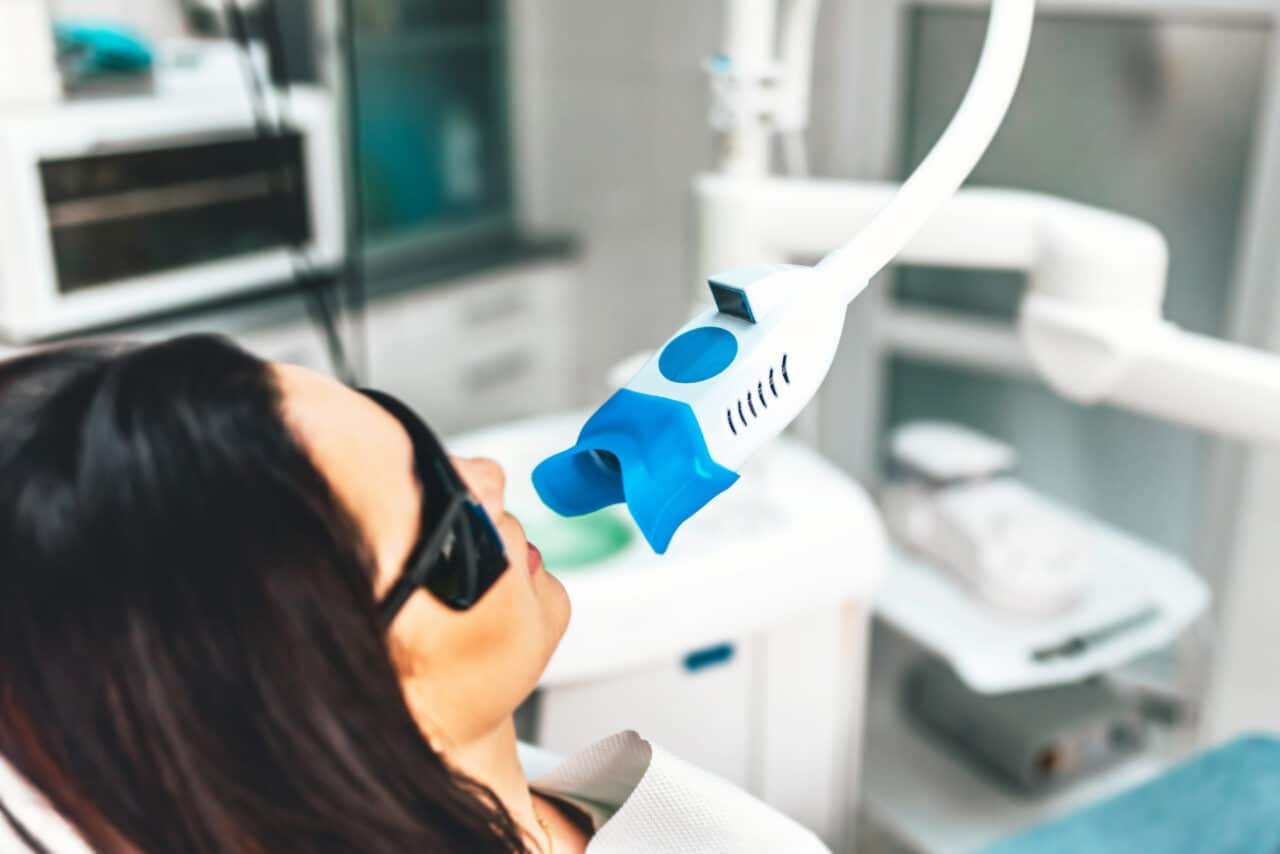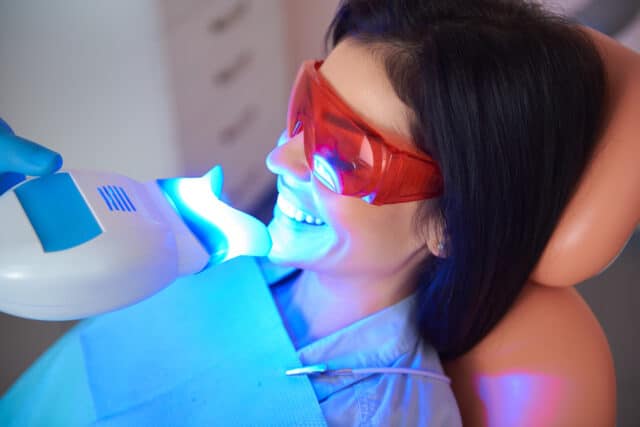People love a white smile and want to get rid of years of stains on their teeth. There are plenty of options to do that today from home whitening kits to whitening strips, gels, and professional whitening procedures by your dentist.
Widespread Use of Whiteners
Americans are paying more than $1 billion a year on whitening products and services. It is important to many people. The global teeth whitening market was expected to reach $7.2 billion this year. It is predicted to grow by 5% from this year through 2030.
Data gathered from the U.S. Census and Simmons National Consumer Survey (NHCS) shows that 37 million Americans used some form of tooth whitener in 2020, which is the latest number. Additionally, 67 percent of American adults have tried some form of teeth whitening.
Those considering these treatments wonder two things. First, they want to know if it works. Second, they want to know if whitening teeth is safe. For this article, we’re going to look only at the professional teeth whitening offered by dentists.
How Does Professional Teeth Whitening Work?
Dental patients that want to guarantee the results of teeth whitening should schedule a session with their dentist. While all forms of teeth whitening have some degree of success, a whitening procedure in a dentist’s office is the only one that offers immediate results.
Your dentist will look at the stains on your teeth and discuss with you which shade to aim for in teeth whitening. Depending on the amount of stain, it may take more than one session to achieve the results you desire. However, most dentists can lighten teeth up to around three shades in one session. That’s enough to see visible results.
Teeth whitening in a dental office takes between an hour and an hour and a half in most circumstances. Some have new technology that speeds up the process to 45 minutes but that isn’t available in every office yet.
One advantage of going to your dentist for teeth whitening is the results will last longer with professional whitening. While the products used by your dentist and over-the-counter whitening products are the same chemicals, the concentration used by your dentist is stronger.
A reason why teeth whitening from a dentist doesn’t cause damage is that the whitening procedure isn’t something that people do too often. Data shows that those who get professional teeth whitening from their dentist go either annually or every 18 months for the whitening service.
Tooth Construction
The one concern people have about teeth whitening is whether it will damage teeth over time. Teeth are made up of three components. Cementum is a hard surface that covers the tooth root and is unaffected by whitening.
The outside of the tooth is covered by another hard substance called dentin. It is a calcified tissue produced by the body. Enamel is over that also covers the entire tooth. The concern is whether whitening products will damage the enamel or the dentin.
Whitening Chemicals
The two chemicals dentists use for whitening teeth are hydrogen peroxide and carbamide. Both have similar chemicals that do the same thing, which is to whiten teeth. Carbamide peroxide is different from hydrogen peroxide in that it activates half of its whitening ability over the first few hours of treatment but can stay active for hours after.
Dentists Trust Whitening Agents
Dentists have been using these same bleaching products for at least 50 years on millions of patients and even other dentists. They are sold on their safety and state the years of use have proven their effectiveness as well as safety.
There hasn’t been any increase in things like cavities, tooth breakage, or chipping among those who get their teeth whitened regularly. Hydrogen peroxide and carbamide whiteners have also been verified as safe and effective by the American Dental Association (ADA).
Research Studies
Three studies coming out of Stockton University in New Jersey suggest that hydrogen peroxide can damage the dentin in teeth. However, the studies considered only whitening strips and not professional teeth whitening. Dentists are also quick to point out that the studies were conducted in a lab and didn’t include human experiences.
A separate study published in Dentistry Journal suggests that whitening products could soften or roughen a tooth’s surface. The study evaluated both in-office whitening and products like whitening toothpaste. The study was largely inconclusive because its authors said it’s hard to compare such different products.
The study’s authors concluded that chemical bleaching has good results with the best results occurring in a controlled environment like a dental office.
One way to know those whitening products are safe is by the lack of lawsuits and court cases filed against dentists using them. There aren’t any. In this day and age of litigation, lawyers would file individual or class-action lawsuits if a whitening product or procedure was unsafe for patients either by causing damage to their teeth or their health.
Aftercare of Teeth Whitening
Your teeth and mouth may be a little sensitive after getting them whitened at the dentist. You should avoid extremely hot or cold foods and beverages for a few hours after getting the procedure done, depending on how your teeth feel. Every case is different and some people feel no tooth sensitivity at all.
Teeth sensitivity after a whitening procedure usually goes away in a day or two. Be sure to call your dentist if your teeth don’t feel normal after a couple of days or if you experience any pain.
Ask About Whitening
A good way to get all the facts on teeth whitening is to talk to your dentist. They can tell you what kind of results you can expect and how you can best maintain your whiter smile once you go through the process.
Your dentist can also talk to you about any safety concerns you may have and show you the results of previous patients who have had their teeth whitened.


